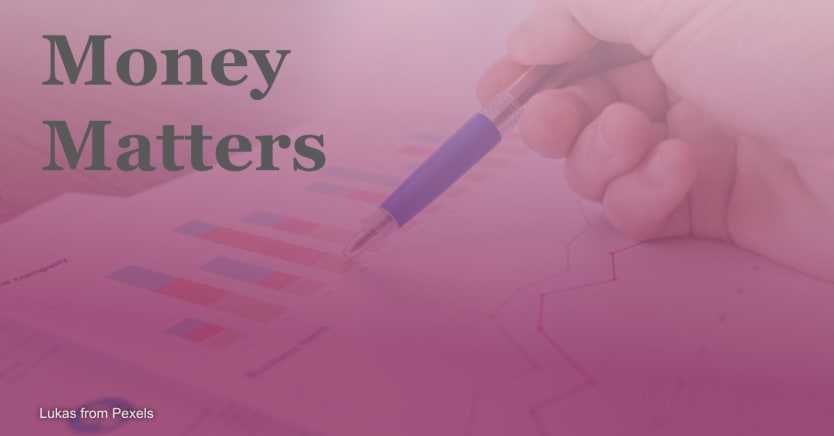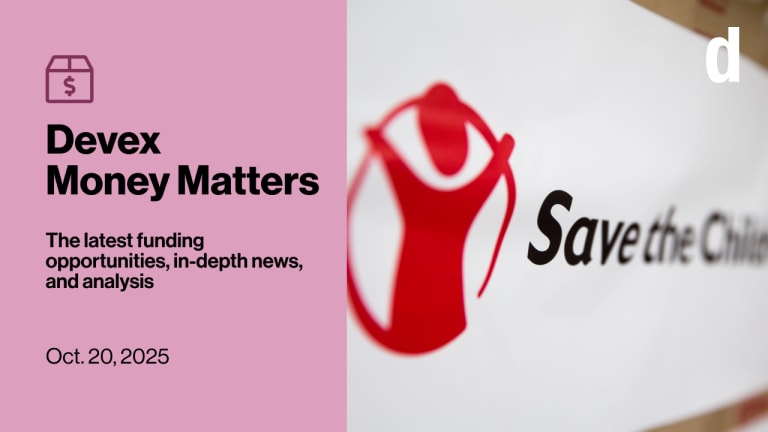
Pakistan says it needs tens of billions to rebuild after torrential floods. But is the country getting the aid it needs? In today’s edition of Money Matters, we also have a “how to” piece on getting your M&E function right, and an exclusive on how a new IT system jumbled the Danish Refugee Council's finances.
This is a preview of Devex Money Matters
Sign up to this weekly newsletter and get the latest in development funding in your inbox every Monday.
+ The 77th U.N. General Assembly High-Level Week kicks off today. We have a curated list of the events to pay attention to, and you can sign up to our own Devex @ UNGA 77 virtual event, delivered straight from the sidelines of the conference.
After the flood, a trickle
Earlier this year, we reported on figures from the U.N. Office for the Coordination of Humanitarian Affairs, which showed that most of the largest humanitarian crises were not attracting enough funding to meet needs. Since then, the situation appears to have gotten worse, with debt and energy and food price inflation driving more countries toward difficulties, and the world teetering on the edge of a global recession.
And it is increasingly clear that the crisis in Ukraine has diverted significant sums of aid away from other locations.
With that in mind, it is both worrying and unsurprising to read about the level of aid that has so far flowed to Pakistan. Multiple sources say a third of the country is under water, and the government has stated it needs at least $30 billion to tackle the crisis. But current commitments are only a fraction of those levels.
Pakistan: How much aid is flowing after the floods? (Pro)
+ Try out Devex Pro Funding today with a free five-day trial, and explore funding opportunities from over 850 sources in addition to our analysis and news content.
Funding activity
ADB. $30M to strengthen health security in Kyrgyzstan.
DOS. $756M to provide humanitarian assistance in Syria.
EBRD. $50M (€50M) to support green investments and climate resilience in Turkey.
IDB. $100M to enhance the water and sanitation sector in El Salvador.
IMF. $31.9M to maintain macroeconomic stability in Madagascar.
TB or not TB (and AIDS, and malaria)
It’s the U.N. General Assembly high-level week, and it’s worth reminding you that a team of Devex reporters will be at the event to pick up stories, and we’re running a series of panels and podcasts.
But it’s also worth focusing on some of the big events happening in the world of development. One of the key issues is the seventh replenishment of the Global Fund to Fight AIDS, Tuberculosis and Malaria. The fund is looking for $18 billion, but it faces many of the same issues as the emergency appeals mentioned above. The global economy is precariously positioned, and the eyes of the world are on Ukraine.
We’ve looked at the funding position so far.
Global Fund: Pledges, expectations, and what's at stake
Opinion: Global Fund replenishment must include gender-focused targets
ICYMI: The global development issues we're watching at UNGA 77 (Pro)
+ If you'd like to know about what's needed to accelerate progress to end TB by 2030, register for our live event on Thursday.
Getting IT wrong
Featured Opportunity: Banking on Women
The International Finance Corporation has lent $100 million to Mibanco, a Peruvian financial institution lending to micro-entrepreneurs, in order to create more inclusive markets. The funding will go primarily to help women in underserved areas in Peru. The project is part of IFC’s Banking on Women business.
It’s one of the worst nightmares for an executive team and board: a major IT project going badly wrong, leaving the organization unable to function properly while the technology is sorted out.
That’s exactly what happened at the Danish Refugee Council, which has spent years sorting out the mess caused by a new enterprise resource planning system.
During the process of implementing it, the organization chose to part company with its secretary general, and found itself unable to confirm to the nearest million how much cash it had on the balance sheet. The uncertainty was so great that auditors qualified the accounts, meaning the underlying records of the finances were so poor they couldn’t deliver a clean audit with confidence.
My colleague Sara Jerving has penned a deep dive, looking at exactly what went wrong.
Exclusive: How a new IT system jumbled Danish Refugee Council's finances
Mind the talent gap
We aren’t going to hit the SDGs.
That much should be obvious by now. The world is way behind, and the amount of money needed to reach these highly aspirational targets is absolutely mind-boggling. It probably is not available.
But it’s not just money we’re missing. There’s also a talent gap within the organizations working towards the Sustainable Development Goals. My colleague Jason McNaboe has looked at what this means in practice.
Supply and demand: Does global development have an SDG talent gap?
This is the first in a Devex career series titled: Bridging the SDG talent gap, which is aimed at reinforcing the big-picture connection between our social enterprise, global development and the SDGs. Stay tuned for more, and take our survey to get involved.
Plus, if you haven’t, sign up for a Devex Career Account today and get 50% off to fully access our latest visual report on pursuing a development career with the United Nations.
It’s not you, it’s M&E
Monitoring and evaluation continues to gain focus and importance in the development sector. But too many organizations are still not getting it right. Rebecca Root, writing for Devex, asks the experts how it’s supposed to be done.
Best practice: How to improve your M&E function (Pro)
Sign up to Money Matters for an inside look at the biggest stories in development funding.








